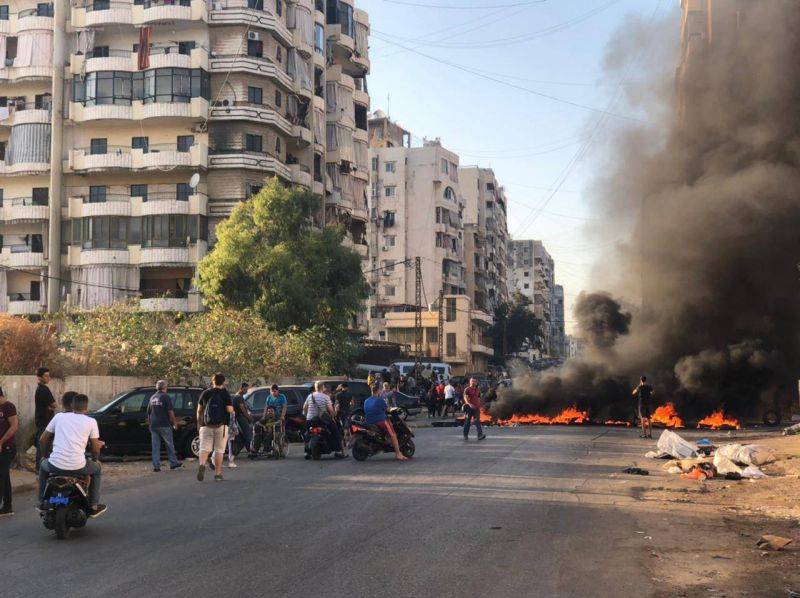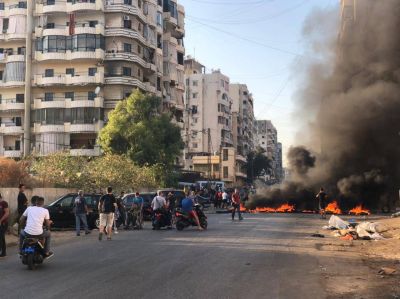
Protests broke out in Tripoli on Wednesday afternoon. (Credit: Sawratcom)
In Tripoli, electricity blackouts can spark violent reactions.
Rumors of a child’s death after his breathing machine stopped working were among the reasons for the eruption of residents’ anger in the city’s Bab al-Tabbaneh neighborhood on June 30 — an anger so virulent it led to clashes with the army. The child, it transpired, had indeed been deprived of oxygen, but was still alive.
Protesters, meanwhile, broke into the premises of the Qadisha Electricity Company, located in Bohsas, in a bid to force its employees to supply some of the city’s neighborhoods with power.
Gasoline in Tripoli is perhaps even more valuable than in the other parts of the country. The parallel market has under its sway supply and demand, due to the city’s proximity to Syria, which favors smuggling, and to the state’s weakness.
Remarkably, the demand for gasoline means traffic jams are gradually disappearing in the city.
“Look around you, there are not many people. Half the city [residents] are lined up at the [gas] stations,” a shopkeeper on the city center’s Azmi Street said.
Power supply from the state-owned Électricité du Liban has been practically nonexistent over the past weeks. Just like in other parts of the country, supply hours often don’t exceed two per day. The 90 percent EDL-owned Qadisha Electricity Company, which is in charge of power distribution in the city, provided about 14 hours of power supply daily up until a few months ago. Such declines in power supply are slowing down the economy nationwide.
“There is absolutely nothing I can do. I can neither solder nor operate the machines. It’s impossible for me to pay LL500,000 per month for a 10-ampere generator service,” said Bachir, who owns a small computer repair shop.
The carpenters in the coastal Mina neighborhood, which is close to Tripoli’s port, have sounded the same alarm bell.
Sitting in his workshop, with a cigarette in his mouth and his hands covered in soot, Ahmad said that he is unable to work.
“We cannot turn on our machines. The only thing we can do right now is to sell [what we have] and leave this country, which no longer wants us here,” he said.
The partial lifting of hydrocarbon subsidies is likely to deal a severe blow to the neighborhood’s families and merchants. Fuel prices increased again on July 1, with the price for 20 liters of 95-octane gasoline hitting LL70,100.
Unaffordable parallel market
In the country’s poorest city and across Lebanon, generator owners are obliged to ration power supply hours to their subscribers. A total blackout prevailed over Tripoli’s city center for long hours in the middle of the day on June 30.
These recurrent and extended power cuts do not bode well when it comes to these operators’ ability to bridge gaps in the state supply. Khazneh, a neighborhood generator operator, explained that he cannot keep up with this pace for long.
“We are having tremendous difficulty obtaining diesel in a legal way. The only available option is the black market, where a gallon costs almost double the price. It cost me LL65,000 today to fill the tanks instead of LL38,000,” he said.
Diesel shortages pose a major challenge to these generator operators who bear the burden of providing power when the state doesn’t. Generator owners admit that the fuel shortage situation has been exacerbated dramatically over the past two weeks, and that most of them are now obliged to reduce supply hours by four to five hours daily.
In some cases the reductions are even greater. Fadel, a generator operator that supplies the Mitain and Azmi neighborhoods, was forced to reduce supply hours by about seven hours per day due to shortages.
“It is impossible to find a single drop of diesel, and the prices on the parallel market are unaffordable,” a representative of the company said.
The black market for fuel remains generator owners’ last resort for filling their tanks. However, when protesters block roads, this market comes to a standstill.
“They [black market fuel distributors] are afraid of driving tank trucks when young people block the roads. Protesters, believing that the trucks are carrying fuel to Syria, will seize them,” Beytieh, a heavyweight in Tripoli’s electricity market, said, explaining why during demonstrations it is so difficult to purchase fuel from the black market.
Machine maintenance is another challenge for generator owners. “I have to pay $500 in cash for the engines’ oil and oil filters. It is a big waste,” Fadel added. The price of these maintenance oils has increased tenfold due to inflation, as has the price of filters and spare parts.
Generator owners admit that some of their generators are out of service because they cannot afford to repair them. “Two of my generators in Abu Samra are out of service. I need a $5,000 loan to repair them. It is better for me to sell them,” Khazneh said.
Some operators have managed so far to maintain supply hours, including Rattel in Mina. This generator operator said it is still able to purchase diesel on the market, despite the daily pressure they endure so as to obtain it. “Our suppliers haven’t cut off supply yet, but we don’t know what tomorrow holds,” a representative of the company said.
Such disparities in distribution have generated tension among generator owners.
“It is a very tense situation. We had agreed among each other in Tripoli to never take each other’s clients. The situation today risks exploding, and many conflicts have emerged, as the clients are determined to switch from X [service provider] to Y,” Beytieh said.
This article was originally published in French in L’Orient-Le Jour. Translation by Joelle El Khoury.
